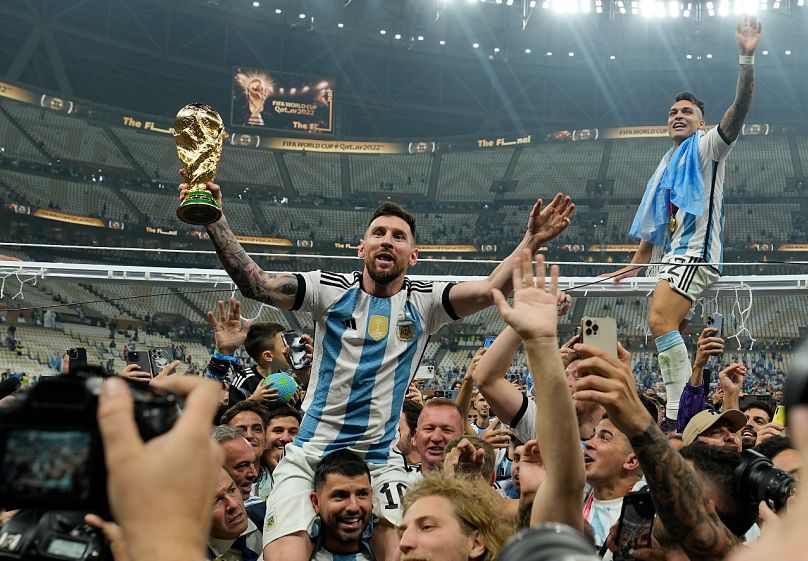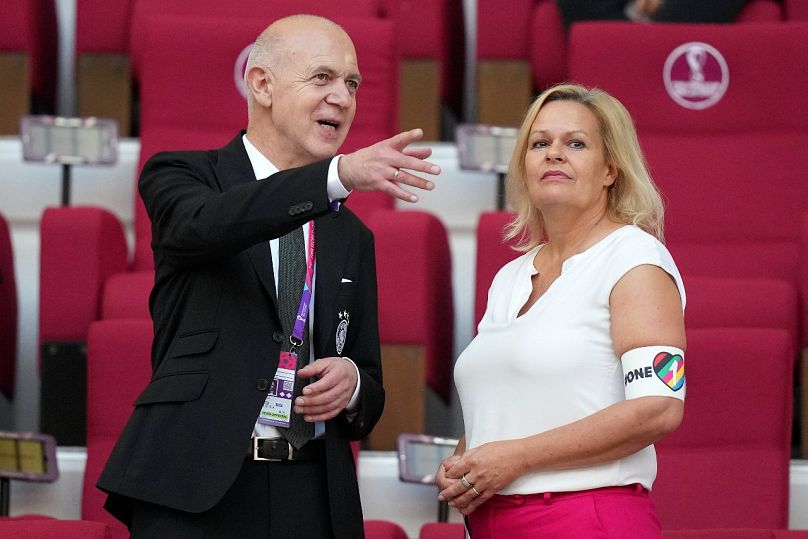From Lionel Messi and Argentina's triumph in a thrilling final against France, to concerns over future human rights -- five main themes to emerge from Qatar 2022.
1. Messi contender for world's greatest as fairy-tale victory caps Argentina's triumph
He inspired his team throughout the tournament, scored two goals in the final before successfully converting his spot-kick in the shootout, and crowned it by lifting the World Cup trophy.
In doing so, Lionel Messi made his strongest case yet to be considered football’s greatest footballer of all time.
Messi’s failure to win the sport’s biggest prize until now has always counted against him when measuring his achievements against Pelé and Maradona.
The seven-time winner of the Ballon d'Or award for the best player in the world, and four-times Champions League winner, won the Copa America for the first time with Argentina last year.
Now the team's achievement in Qatar puts Messi in the company of Pelé -- who won the World Cup three times with Brazil -- and his compatriot Diego Maradona, who captained the national team to the 1986 World Cup title.
At 35, this year's tournament was widely seen as his final shot at the World Cup. He scored seven goals in Qatar, bringing his total at World Cups to 13 -- more than either Pelé or Maradona.
But his assists were equally valuable: his disguised pass for Nahuel Molina’s goal against the Netherlands in the quarter-finals, the twisting run to beat Croatia defender Joško Gvardiol and set up teammate Julian Alvarez in the semifinals, and then some magnificent one-touch play in the build-up to Argentina's second goal in the final, scored by Ángel Di María.
Argentina's triumph, 4-2 on penalties following a 3-3 draw after extra time in arguably the most thrilling World Cup Final ever was an astonishing finale to a tournament which began with a false start defeat 1-2 to Saudi Arabia.
It's also a tonic for a country -- so often beset by economic crises -- which had lost its last two finals since its victories back in 1978 and 1986.
2. Was it the best World Cup Final ever?
That will always be a matter of opinion -- but here's what some of those involved, as well as commentators, have said:
"The match was completely insane... I know it’s just a football game, a World Cup, and we shouldn’t think any further, but in Argentina, football is not just football. We have to celebrate" -- Argentina coach Lionel Scaloni.
"This game showed why football is the greatest game of all. This one is an all-time classic" -- former England and Liverpool defender Jamie Carragher, on Twitter.
"Best World Cup Final Ever" -- retired Jamaican sprinter Usain Bolt, widely considered the best ever, on Twitter.
"I've never seen anything like it and I don't think I'll ever see anything like it again. It was staggering" -- former England striker Alan Shearer, on the BBC.
"Incredible game. Surely the best ever final?" -- former England striker Michael Owen, on Twitter.
"One of those heroic matches that stand the test of time... (but also) one of those dagger blows that go right through the heart" -- French sports paper L'Equipe.
3. Underdog Morocco the toast of the Middle East as big guns are sent home
Despite their semi-final defeat to France, and then to Croatia in the playoff final, Morocco's achievement at the World Cup finals will be long remembered.
The North African team's run to the semi-finals saw them overcome three European and global heavyweights: Belgium, Spain and Portugal.
Not only was Morocco’s showing in Qatar the most surprising story of the World Cup, the Atlas Lions were also the first Arab nation to go so far in the tournament, sparking an outpouring of pride among Arab countries during an event being held in the Middle East for the first time.
"For me, football makes people dream and children in particular," Morocco coach Walid Regragui said. "In Morocco and Africa, we have kept those dreams alive."
FIFA president Gianni Infantino described Morocco's performance as "exceptional" and "fantastic", also praising those of the other African nations, Senegal, Cameroon, Ghana and Tunisia.
The tournament also saw other footballing giants brought to their knees. In the quarterfinals, FIFA's No1 ranked country Brazil crashed out on penalties, albeit to 2018 finalists Croatia.
In the group stages, Japan upset Germany 2-1 and then defeated Spain by the same score in the final game which sent the Germans, the 2014 world champions, home early.
And the only blip in Argentina's 36-match unbeaten run before the tournament, and eventual journey to victory, was the shock opening game defeat 2-1 to Saudi Arabia.
4. FIFA hails 'best ever' World Cup, detractors beg to differ
On Friday -- even before the thrilling finale -- Infantino, FIFA's president, hailed "the unique, cohesive power that this World Cup has shown", describing the tournament as "the best World Cup ever".
The tournament was certainly the best in cash terms for world football's governing body. In November, before the finals got underway, FIFA revealed record revenues of $7.5 billion (€7.06 billion) in the four years of commercial deals tied to the 2022 tournament.
The next World Cup is expected to be an even bigger bonanza: FIFA expects to earn $11 billion (€10.36 billion) in the 2026 World Cup cycle with a 48-team men’s tournament in North America.
Qatar certainly defied doubts that it could host such a global event in the country of just three million people, the first Arab country to host the tournament. Officials have been delighted by the way the tournament panned out -- despite prior fears that a boycott may take hold among spectators.
"We have fulfilled our promise to organize an exceptional championship from the Arab countries, which provided an opportunity for the peoples of the world to learn about the richness of our culture and the originality of our values," the Emir of Qatar, Sheikh Tamim bin Hamad Al Thani, said on Twitter.
"The World Cup transcends sports and it plays an exceptional role in uniting people and countries," said Qatar's ambassador to the United Nations Sheikh Alya al-Thani at a ceremony marking the handover to the 2026 hosts in North America.
Doha's transport systems have been praised, and pre-tournament problems at matches largely seem to have been overcome once the competition got under way. A capacity crowd of nearly 89,000 watched the final in one of several stadiums built especially for the occasion.
"Qatar has organised this World Cup very well. The organisation is good, the security is good," French President Emmanuel Macron said last week, attracting criticism from opposition parties at home.
“Qatar has won a lot of friends because of this World Cup and the way it has been handled,” said David Dein, the international president of England’s bids for the 2018 and '22 World Cups.
But the praise was far from unanimous. A week into the tournament the fans' body Football Supporters Europe (FSE) criticised "multiple human rights abuses... against players, fans and journalists" at the World Cup, citing problems ranging "from ticketing issues and poor crowd control to discrimination and defending authoritarian governments".
5. What next for human rights when the floodlights are switched off?
Although it was gradually eclipsed by the football, controversy over Qatar's record on human rights continued into the tournament.
The German team covered their mouths before their opening match in an apparent protest with FIFA over showing support for the LGBT community in a country where homosexuality is outlawed. FIFA had threatened teams whose captains had intended to wear special "one love" armbands. Some supporters wearing the LGBT rainbow symbol were challenged as they tried to enter at least one stadium.
Protests surrounding the World Cup were not exclusively aimed at Qatar. The Iranian team stayed silent as the national anthem was played before their opening World Cup match, declining to sing in a gesture seen as a sign of support for the victims of the harshly repressed protests in their country.
“It was always inevitable that the conversation would increasingly turn to football once the tournament started, but human rights questions have never gone away and will continue to be raised long after the tournament,” Steve Cockburn, head of economic and social justice at Amnesty International, told The Associated Press.
Amnesty says thousands of migrant workers have died “suddenly and unexpectedly” in Qatar over the past decade.
Campaign groups including Amnesty and Human Rights Watch accused FIFA on December 12 of misleading the world over a remedy for migrant workers.
"FIFA is still failing to fulfil its human rights responsibilities by refusing to commit to compensate migrant workers and their families for abuses while preparing and delivering the World Cup 2022 tournament in Qatar," they said in a joint statement.
"Qatari authorities and FIFA have made grossly inaccurate and misleading claims that Qatar’s current systems are adequate to address widespread current and historic abuses faced by workers," Human Rights Watch said in a subsequent post on December 16.
David Dein, president of England's previous tournament bids, says he believes the Qataris are "very open-minded" to the idea of change. However, concerns have been raised over future rights, not least those of women and the LGBT community in a country where protest is not tolerated.
Long-standing human rights campaigner Peter Tatchell, who staged a one-man protest in Qatar a month before the tournament began, says people are forced to discuss potential reforms in small, private groups.
"I know among younger Qataris in particular there is a move for change. There is a movement for democratic reform, for a more liberal inclusive society," Tatchell told BBC radio.
"I love Qatar, I love the Qatari people, I just don't like the dictatorship and the abuse of human rights," he added. "But the fear is that once the World Cup is over, and the international media have moved on, that there will be intensified repression. I hope we are wrong... and it's in Qatar's interest to move forward, not backwards."













